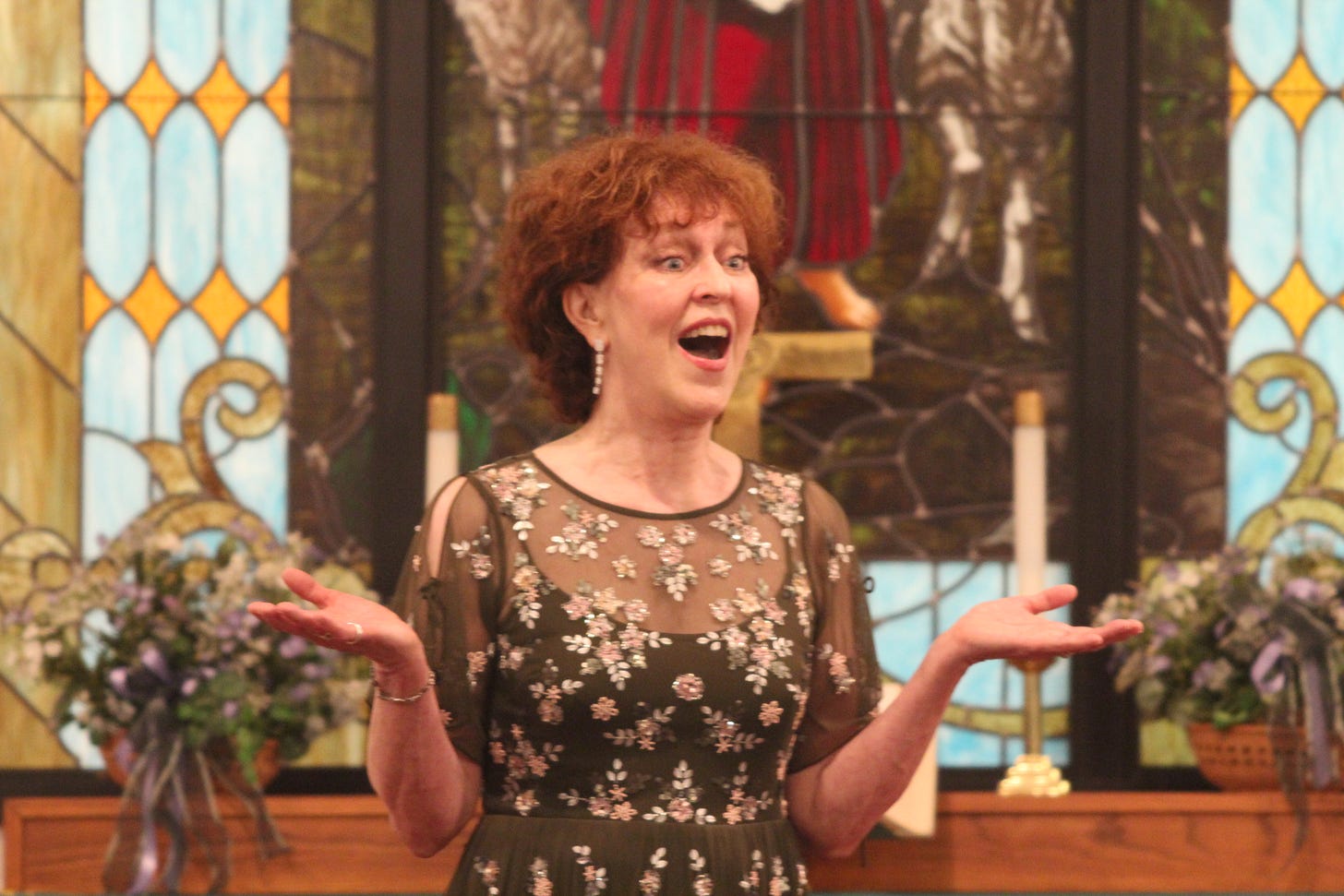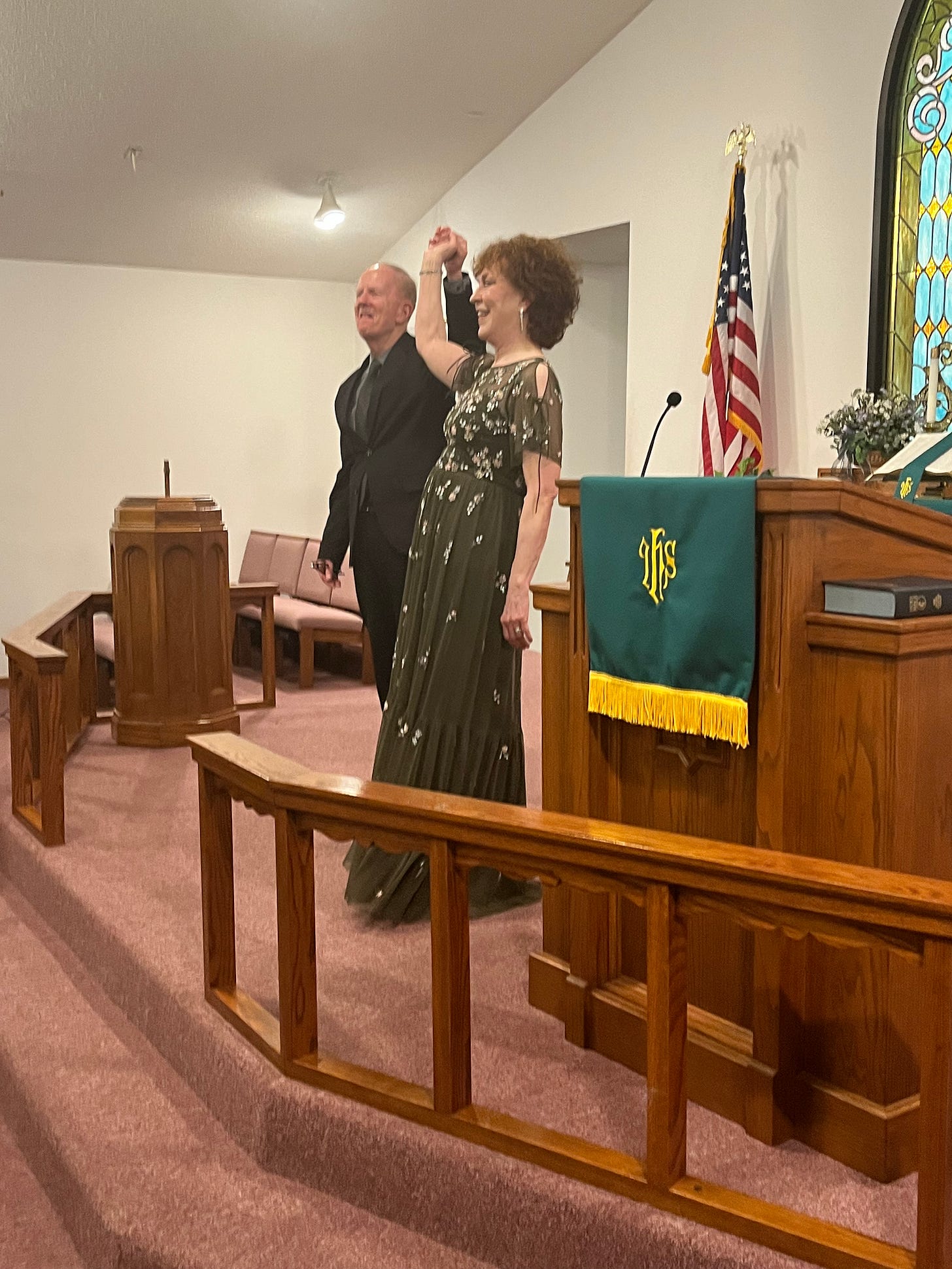Imagine you're an operatic soprano living in New York City. You've performed in Europe, appeared in two live from Lincoln Center broadcasts with the New York City Opera in the title role of The Merry Widow, and Musetta in the Emmy-winning La Boheme, as well as a dozen or more national opera companies across the U.S. You've released your own CD, featuring arias in eight languages.
What's your next career move?
Naturally, your strategy would be to hightail it to the Midwest in March 2025 . . . where you'd book a concert in Pilot Mound, population 163.
For opera singer Jane Thorngren, this week's concert was a coming home. She launched her vocal career at age 3.5 years, singing at the United Methodist Church here where her mother Mildred was the organist and choir director –– as well as an all-around force of nature.
Thorngren, a farm girl who graduated from Grand Community at Boxholm, Iowa, and studied music at Drake University, went on to earn an advanced degree at the University of Southern California. It led her to operatic roles and concert stages in Canada, Mexico, Europe, South America, the French Indies, and Asia. as well as with symphonies in Pittsburgh, Seattle, Phoenix, Savanah, Hartford, Birmingham, Denver, Vermont and chamber orchestras in NYC, Los Angeles, Pasadena, Europe, Japan, Hong Kong, Armenia, and many others.
Thorngren met her husband, Walter MacNeil singing Violetta to his Alfredo in a production of La Traviata with the Knoxville Opera. They married in 1990. MacNeil grew up in the opera world, spending his boyhood years in Italy with his family and his world-renown father, baritone Cornell MacNeil. Cornell, a native of northern Minnesota, compiled 642 performances in 26 roles with the Metropolitan Opera between 1959 to 1987.
Chance Meeting Forms Lasting Bond
Despite the bright lights of NYC and the allure of exotic world destinations, Jane never forgot her roots here in Pilot Mound. When our two-story frame United Methodist Church burned to the ground in 1998, she and MacNeil returned from New York City to perform a benefit concert at the First United Methodist Church in Ames, raising $10,000 for our rebuilding needs.
After the passing of her beloved parents, Bob and Mildred, she continued to come back for reunions at Grand Community School, where she graduated with my husband in a class of 22. During these visits, Walter and Jane sometimes sang at our morning church services.
In 1990, she was one of two former students asked to sing at a memorial concert at Drake University for her former voice teacher, Dr. Marion Hall. Thorngren joined Drake University alumnus, baritone Mark Rucker at City Opera, for a rehearsal where she met Duane Funderburk for the first time. Funderburk had jumpstarted his career by founding his first orchestra and arranging compositions when he was in junior high school in Tacoma, Washington, and later earning a degree from Boston University. He created a series of concerts in Everett, Washington, and collaborated with artists in the U.S. and in 13 countries abroad.
Funderburk had moved from the Pacific Northwest with his wife Janni to serve as director of music at First Assembly of God Church in Des Moines. It was the beginning of a wonderful bi-coastal musical collaboration with Thorngren.
The Show Must Go On
The Funderburks moved to Pasadena in 1992, where Duane pursued his doctorate in collaborative piano. Soon he was asked to found an orchestra at Lake Avenue Church. By 2000, he had co-founded The Los Angeles Collaboration, a violin and piano duo, which led to touring with orchestras and performing as a duo in 50 concerts annually in 10 countries. He also became a well-known arranger and composer of choral and orchestral music; with his arrangements published by MorningStar Music of St. Louis beginning in 2005.
Thorngren and Funderburk made their first recording together within a few years during a trip back to Des Moines, with an arrangement of It is Well with my Soul he wrote for Jane. They went on to record two compact discs together and work with one another at recitals and concerts over the next three decades. They performed several concerts at Norwegian Seamen's Church & Culture Center in New York City, with the most memorable one in 2019.
Then along came Covid, and the stage lights went dark. Remember watching Italian tenor Andrea Bocelli's concert at Milan's empty cathedral, Piazza Duomo five years ago on Easter Sunday? andreabcelli.lnk.to/LiveFromDuomo. Thorngren spent the unplanned hiatus learning. "You have to keep your instrument up, you can't let it go," she says. "I put together new programs that I had no idea when I'd ever do."
MacNeil had retired from professional singing, but Thorngren and Funderburk weren't done yet! In 2021 they performed in Montana, Pasadena, and New York City. "What a thrill to sing again," she recalled.
They met here in Iowa in the fall of 2022 for a couple of concerts, and we all assumed it could be the last time!
But then last fall, she called to say they were discussing a tentative mini-Iowa tour, performing with the orchestra in Cedar Rapids on Sunday, March 30, and then heading to Pilot Mound to do a fundraiser for our church. I marked my calendar, and waited.
In early January, she called again, telling us the devastating news from Duane. His Altadena, California, home of 30 years, along with his backyard music studio and his Yamaha grand piano, had been swept up and consumed by the flames of the Eaton Fire. Their car in the garage, along with his wife's family jewelry, every stitch of their clothing, and his musical scores created over a lifetime, all were reduced to ashes on the night of January 7.
The Funderburks were two states away when it happened. Their return to Altadena in February to sift through the ashes and charred fragments yielded nothing of tangible value. But one intangible treasure emerged: the creative spark still glowing in the embers beneath the rubble. Funderburk determined to proceed with the Iowa tour in March. The show must go on!
"The loss is great," he says. "But I began to realize that life must go on, and we needed something to take us away from the loss, insurance forms, valuations, replacement of documents, and help bring us back to normalcy. For Janni, it was a return to her job and friends in Pasadena. For me, it was making music, returning to music. So many others from our church have reached out to us, and it's been life-giving. Now I could reach out to help others."
Overcoming Roadblocks, Detours, and Blizzards
One week before the concert, work began on tearing out the bridge just west of Pilot Mound. The detour would require rerouting on gravel roads from the north, west and south. The concert had been promoted in surrounding communities, but no tickets were sold in advance. Would people go out of their way to come? Would others, unaware the bridge was out, arrive late? Would removal of the bridge create a barrier to bringing our communities together?
Then, the following Sunday, the winds picked up, and seemingly out of nowhere we were enveloped in a driving blizzard, reducing visibility, and dropping a couple inches of snow. But Thorngren, MacNeil and Funderburk arrived safely from Cedar Rapids. The weather forecast promised a better day on Monday.
And so it was.
By 7 p.m., the audience had settled in, filling the church pews. The concert repertoire featured two sets of classical art songs in Norwegian and German. (Translations provided in the program.) Next, Thorngren and Funderburk followed with familiar show tunes: With a Song in my Heart, To Keep My Love Alive, Something Wonderful, No Other Love Have I, and If I Loved You.
Standing in the church foyer afterwards, I thanked a gentleman for attending. But he thanked me, choking up, as he said, "The music brought tears to my eyes" before turning away to leave. Thorngren said another man confessed the same to her. "I had seen him fighting back tears during the concert," she said.
Did the songs evoke memories of a loved one who had passed? Possibly reignite the regrets of a long-ago lost love? Or simply underscore the fragility of life?
"No other love have I,
Only my love for you!
Only the dream we knew,
No other love!
Watching the night go by,
Wishing that you could be,
Watching the night with me,
Into the night I cry!"
"You never know when you might strike a chord in your audience," Thorngren says. "You just have to put it out there. You can't know the impact. But you know there will be an impact."
The concert performance brought home two life lessons:
# 1: The power of music, with its capacity to offer healing through the experience of traumatic loss. Just ask Duane Funderburk. Altadena was home to many working musicians. The Funderburks feel fortunate since insurance has enabled them to rent a home in a nearby neighborhood. Recently neighbors have tried to persuade them to rebuild, a long-term proposition. At Lake Avenue Church, where Funderburk is director of Worship and Arts, the concert master of the Lake Chamber Symphony organized a "Songs of Renewal" fire relief benefit concert in March, and 600 people donated $40,000 to a dozen musicians and artists who lost their instruments, scores, and artwork in the wildfires.
Earlier this week, the death toll from the Eaton Fire rose to 18, as investigators discovered one more Altadena life lost. Today the Funderburks, and their close-knit community, still are taking stock of what's been lost, and just as importantly, what is left.
"Music and the arts can connect people," Funderburk says. "It can bring healing and restoration to musicians who continue playing, singing, and creating through this time of crisis. It's also a critical time in our country to make and share our music, despite our differences, and work toward rebuilding community."
# 2: The learning never ends. Thorngren's prelude to her 50-minute program without an intermission was a voice lesson in Omaha with her longtime voice teacher, Judith Natalucci, who moved there from New York City to be near family. "You can't do it without a teacher, and I have a magnificent one," Thorngren says. "Your body changes, and you have to rework your techniques. It's a constantly evolving process, and if you don't enjoy re-learning how you've sung it before, don't do it. It's a lot of work. I only want to sing at a certain level, and I hope I know when I'm not. There's not many of my contemporaries still performing."
Singing well requires many different muscles, and a lifetime of singing develops muscle memory built on a foundation of resilience, perseverance, passion, and discipline. . . all qualities that also can sustain us through the firestorms and derechos of life, as well as the ravages of time.
Thorngren's concert encore, It's a Grand Night for Singing from State Fair, by Rodgers & Hammerstein II struck yet another responsive chord, and she invited the audience to join in the familiar lyrics the second time through.
It's a grand night for singing,
The moon is flying high,
And somewhere a bird
Who is bound he'll be heard,
Is throwing his heart at the sky!
It's a grand night for singing. . .
And indeed, it was!
If you missed them in Pilot Mound, catch Thorngren and Funderburk at Rutgers Presbyterian Church on 73rd & Broadway, New York City, on April 27!
For more from Funderburk: Fireproof,
Credits: Lake Avenue Church; Section 3 Films
I’m proud to be a member of the Iowa Writers’ Collaborative. Please check out our work here, and consider being a paid subscriber. Thank you!






What a great event in the Iowa countryside! I especially liked your caption on the final photo: “If you missed them in Pilot Mound…”
Cheryl, you encapsulated Jane’s storied career beautifully! One of my fondest memories was when Jane and Walter stayed with us for one of their earlier Pilot Mound concerts…Jane in our musty basement going through her vocals and Walter in the shower doing the same. The old farmhouse never sounded so glorious! Thanks for sharing! I am sad I missed it.